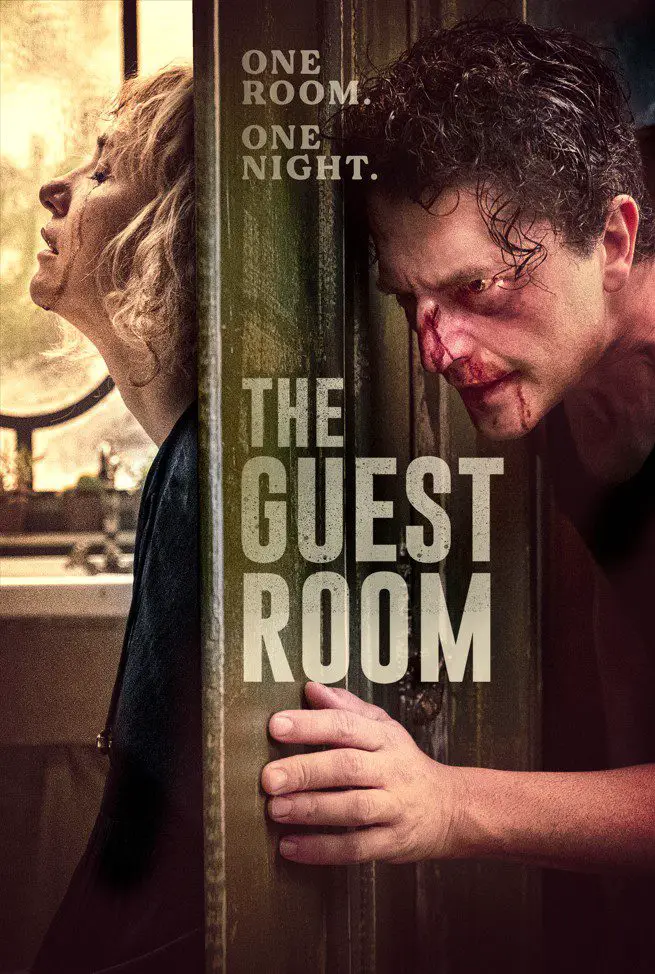Trigger warning: this article contains references to the act of suicide.
If you are having suicidal thoughts or know someone who does, please seek help. You are not alone. Talk to someone you can trust, or call the National Suicide Prevention Lifeline at 1-800-273-8255.
The therapeutic process of writing a letter to your younger self is a hard lesson in forgiveness. When we’re young, we live in the moment more, internalizing our struggles which feel paramount. Some situations are more desperate than others, and when we look back, hoping to change something in the past, we recognize there was more going on than we ever realized. As we get older, we begin to acknowledge that our parents are people who make mistakes too. The Guest Room (La Stanza) is a film that works a lot like one of these letters, looking to rectify the ripples of actions that had an indelible effect. Those actions begin by Interrupting a deeply pensive Stella (Camilla Filippi), dressed as a bride and contemplating her suicide, as a never-ending doorbell ring reaches her trance, coming out of it while carefully balancing on the third-story window frame of her home.

Stella’s visitor, arriving just in time to literally pull her down from the ledge, is a guest (Guido Caprino) claiming to have booked a room over Stella and her absconded husband’s, Sandro (Edoardo Pesce), now defunct rent-a-room website. Despite Stella’s insistence that the booking was made by mistake, the fervently insistent visitor asks for his reservation to be upheld, begging in the torrential rain to at least warm up before Stella sends him away. With empathetic allowance, Stella allows her guest entry, where he begins to cryptically reference things in the home as if he has stayed in the house before.
His enigmatic nature grounds Stella, consistently creating tasks and taking her mind off climbing back onto the window’s edge. The relationship they begin forming is sweet at first, if not for a couple of side comments and actions that make the guest a little creepy. Suggesting he knows tidbits about the future, the guest implies that Stella’s husband will visit her later in the day. When Sandro makes his appearance, the film breaks into a more threatening tone as it follows the ripples of suffering stemming from one decision that changed everything.

Alix Turner saw The Guest Room a while back at 2021’s Grimmfest, calling it “full of tension,” but from the beginning of The Guest Room, I found it easy to read between the lines of the potential twist that stares the audience in the face, despite not having all the evidence laid out immediately. What makes the film work and allows it to thrive outside of the obvious, something Alix and I both agree on, is the outstanding work that Filippi and Caprino put forth onscreen. Their chemistry stays magnetic, and the well-tempered pace allows these characters’ charisma to shine. When Sandro finds his way into the foray, the film amasses more of a Funny Games resonance or something akin to other home invasion thrillers. Pesce interrupts the atmosphere, effortlessly infusing Caprino with a bit of unwieldy unease that pushes him into high gear.
Framed like a therapy session, the beginning of the film focuses on self-appreciation over the isolation of being made to feel inferior by things beyond our control. The Guest Room fascinates with its psychological overtones, but there isn’t much depth beyond the film’s straightforward approach. Director Stefano Lodovichi treats this whole process like it’s a personal letter to the past, highlighting shortcomings, nostalgically romanticizing the good times, and attempting to reconcile with the blame that keeps us prisoners of the past. I think he and his partners in screenwriting (Francesco Agostini and Filippo Gili) deserve some praise for the originality of the script, which is thematically sound and melancholically beautiful, with an ending that recalls a similar wistfulness to The Babadook.

On a technical end, the beautiful photography and robust score stand out as the film’s strongest cinematic elements, but the art design is impeccable, allowing audiences to catch the comparison of Stella’s overwhelmed nature through the isolation and deterioration of the home she resides in and the coldness of the film’s colorization. It’s an interesting metaphor that continues as the film does. As the characters begin to break things apart in the house and it’s as if we’re seeing the treatment work. Eventually, Stella takes shelter in a cardboard equivalent, and something about rebuilding in those conditions goes a long way toward making all the difference.
If you’ve seen the trailer, there’s a chance you’ll suspect The Guest Room is going to bend into overly bizarre territory. I can quell those ideas. While there are some reality-defying elements, The Guest Room is very grounded in how it tells its story. Redemption is a difficult road to travel that becomes infinitely more difficult when the actions you wish to redeem aren’t your own. The Guest Room is about regret, trauma, and finding catharsis where that may not have otherwise been possible, yet also concludes by musing on a debt of accountability and responsibility that should also be paid to those hurt throughout our tumult. The Guest Room may not be a perfect stay, but it’s the kind of dread-induced haunted house story that’s rare in horror, struggling with ghosts that aren’t supernatural at all.
The Guest Room is now available on VOD. Find it on iTunes, Vudu, or wherever you buy movies.



